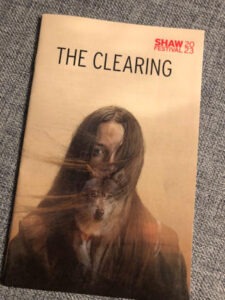
The Clearing At The Shaw Festival
Shaw Festival artistic director Tim Carroll has a soft spot in his heart for the English Interregnum (1649-1660) and its aftermath. In 2019, he presented (and directed) Victory, a scabrous little play by Howard Barker. This season it’s the far superior The Clearing from 1993 by English playwright Helen Edmundson.
The Clearing is a powerful piece of theatre, so much so that its sparse production history is a bit of a mystery. The current production marks the first time an Edmundson play has been mounted by Shaw. If The Clearing is anything to go by (and I confess my total ignorance of her work), let’s hope it’s not the last.
Set in the early days of the Cromwellian reign of terror in Ireland, The Clearing tells the sad tale of two English settler families in the English Pale. (The term comes from the Irish An Pháil Shasanach, literally “the English fence,” an area around Dublin that had been largely cleared of aboriginal Irish. “Beyond the Pale,” today a familiar phrase, referred to wild Ireland, where the indigenous peoples found refuge in the woods where they were hunted for sport like animals.)
These families, the Prestons (Kelly Wong and Bahareh Yaraghi) and the Winters (David Alan Anderson and Sharry Flett), had taken advantage of the “plantation,” in which loyal English “colonists” were given land stolen from the indigenous inhabitants. This was justified in the name of “civilizing” and pacifying backward Ireland. Sound familiar, Canada?
One might think that the Winters and the Prestons would be safe from the depredations of Cromwell’s republicans. Think again. Both families had supported the late, beheaded King Charles over parliament’s forces. To make matters worse for Preston, he had married an Irish Catholic woman.
Sir Charles Sturman (a chilling Tom Rooney), representing the new order in Ireland, is going about the business of settling scores against the disloyal and accelerating the pace of clearing the land of its Irish inhabitants. Far from being despots, in Sir Charles’ view, the new overlords of Ireland are merciful.
Personally, Sir Charles would like to see all enemies of the state buried in a deep pit. Instead, they are generously being sold into indentured slavery in the West Indies where they can start a new life. One character in the play notes that slaves were assets worth taking some care of, whereas indentured servants, who would have to be freed in four or five years if they survived, were easier to work to death.
The alternative to indentured servitude was to be pushed westward, into Connaught, today a rugged tourist attraction, then an unfarmable wilderness. Perhaps it’s needless to say that no such mercy was shown to priests and papists who dared celebrate Mass; they were hanged. Hits you right in the anglophilia, doesn’t it?
You may have gathered that The Clearing is not a tale with a happy ending, but it is a tale well worth attending to. Edmundson does a masterful job of delineating the issues at stake, holding history to account while creating compelling characters. Grim as the story is, she manages to end the play on a note of dark, dark humour that struck me as quintessentially Irish. (It’s worth noting that the play debuted in England at the height of “the Troubles.”)
Director Jessica Carmichael has given The Clearing a sturdy production, although I could have done without the self-consciously arty segues between scenes, which were filled with opaque symbolism.
She has drawn terrific performances from a talented cast, Rooney, Wong, and Yaraghi preeminent among them.
Asa Benally has designed very nice period costumes indeed. I was especially taken by Sir Charles’ pumpkin pants (yes, it’s a term of art among costume designers). What little set there is was designed by Michelle Tracey and Kevin Lamotte provided suitably dramatic lighting.
As good as The Clearing’s cast members are, I would have enjoyed the play more had the Irish roles been filled by Irish actors. I realize that in today’s fraught theatrical environment that might not be a particularly popular sentiment. But if Karen Fricker of the Toronto Star can carp about “heteronormativity” and the lack of “queer romance” in Love’s Labour’s Lost at the Stratford Festival, surely I can be given a free pass to bemoan the lack of Irish representation at the Shaw Festival.
The Clearing continues at the Shaw Festival through October 6, 2023. For more information and to purchase tickets, visit the Shaw Festival website.
For a complete index of reviews CLICK HERE.

